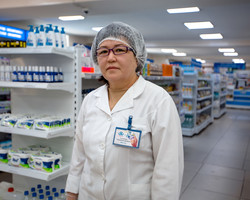Gulbara Dadyvaeva: Community pharmacist, Bishkek, Kyrgyzstan

WHO
My name is Gulbara Dadyvaeva. I studied pharmacology at the Almaty Medical Institute in Kazakhstan and I have been working as a pharmacy manager for 33 years.
More than 1000 people used to visit our pharmacy in the capital, Bishkek, every day. However, since the national authorities declared a public health emergency and introduced physical distancing measures, we only get about two or three hundred customers daily.
Many aspects of our work have become more challenging during the COVID-19 outbreak. We have additional responsibilities and tasks now, including frequently airing the premises and cleaning the tables and stock with alcohol-based wipes. We also remind visitors to maintain a distance between each other.
Early training in the pandemic prepared us well
At the start of the pandemic, our pharmacy staff were supported by a national regulatory agency to learn to recognize and respond to the symptoms of COVID-19. This training was designed specifically for pharmacists because customers rely on us for medical advice and they also ask us where they should go to seek other medical services.
I feel that my staff were well-prepared with information about how to recognize the signs and symptoms of COVID-19. Groups of three staff members were kept together and always worked the same hours. The female pharmacists with children and those who were pregnant didn’t work but were paid for the duration of the curfew.
“Doing my job properly is my contribution”
The emergency regulations and the curfew brought certain restrictions to our daily lives. Mass cultural events, celebrations and gatherings were postponed and some businesses closed. At the beginning it was difficult, but then I just wanted to make my own personal contribution to combating the spread of the virus. Now I realize that doing my job properly is an acceptable contribution.
My personal family circumstances mean that I have to return home every day. However, I try to minimise the risk to others by following protective measures. There is still a risk, but I need to continue working, not only to put bread on the table, but also to help my country. I usually come home very tired, but I always try to find some time for my family.
Responding to a disease outbreak requires a collective effort and relies on the cooperation of everyone in respecting measures designed to slow the spread of infection within the community. In the pharmacy, we displayed posters and infographics from WHO advising the public to clean their hands regularly and thoroughly with hand sanitizer or soap and water.
I think that pharmacists have a strong sense of community spirit and, fortunately, so do the people and government of Kyrgyzstan.



